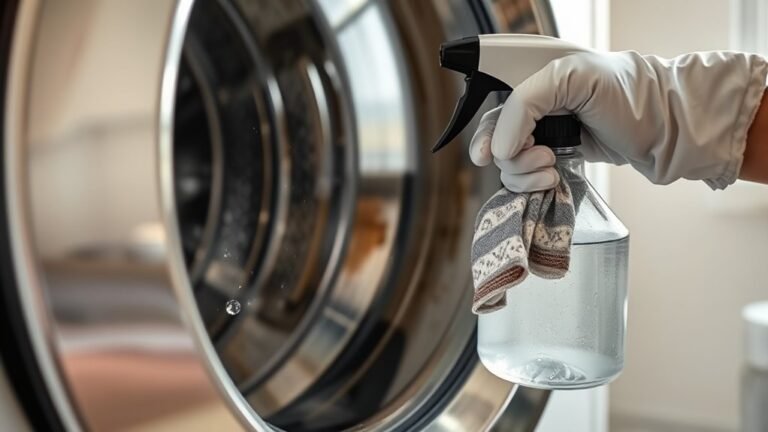Daily Maintenance Tips for Laundry
To keep your laundry routine smooth, clean the lint trap after every load to boost efficiency and prevent fire risks. Wipe down door seals to stop mold and leaks. Check hoses regularly for damage and tight connections to avoid water messes. Leave the washer door open to air out dampness and odors. Use the right detergent amounts to prevent buildup and keep clothes fresh. Follow these basics, and you’ll find even more ways to care for your machines and laundry.
Clean the Lint Trap After Each Use

One simple habit you shouldn’t skip is cleaning the lint trap after every load. By removing lint buildup, you keep your dryer running smoothly and efficiently. When lint accumulates, it restricts airflow, making your dryer work harder and longer, which wastes energy and time—two things you don’t want to lose. Taking a few seconds to clear the lint trap boosts dryer efficiency, helping your clothes dry faster and reducing the risk of overheating or even fire hazards. This small action grants you more freedom from laundry frustrations and saves money on utility bills. Make it a non-negotiable part of your routine, and you’ll enjoy a safer, more efficient dryer that supports your busy lifestyle without unnecessary hassle.
Wipe Down Door Seals and Gaskets
Door seals and gaskets play an essential role in keeping your washer or dryer airtight and efficient. To maintain their effectiveness, regular door seal maintenance is key. After each load, take a moment to wipe down the door seals and gaskets with a damp cloth. This simple step removes detergent residue, lint, and moisture that can cause mold or damage over time. Proper gasket cleaning not only prolongs the life of your machine but also prevents unpleasant odors and leaks. By staying on top of this quick task, you’re ensuring your laundry routine stays smooth and hassle-free. Remember, a clean seal means your appliance runs better, giving you the freedom to enjoy fresh, clean clothes without unexpected interruptions.
Check and Maintain Water Hoses

Because water hoses are essential for your washer’s operation, regular checks are necessary to avoid leaks or bursts. Make hose inspection part of your routine to catch wear, cracks, or bulges early. You want to prevent any unexpected water damage that can tie you down with repairs or replacements. When inspecting, verify connections are tight but not over-tightened, which can cause damage. Consider replacing rubber hoses with reinforced stainless steel ones for added durability and peace of mind. Don’t wait for a leak to appear—proactive leak prevention saves you trouble and keeps your laundry running smoothly. Taking a few minutes to check and maintain your water hoses gives you freedom from sudden breakdowns and keeps your washer performing at its best.
Leave the Washer Door Open to Air Out
After ensuring your water hoses are in good shape, it’s important to keep the inside of your washer fresh and dry. One simple habit that gives you more freedom from mold and musty smells is leaving the washer door open after each load. This lets air circulate freely, promoting moisture management and preventing mold buildup in those tight spaces. Closing the door traps dampness, creating a breeding ground for mold that can affect your laundry and your health. By just leaving the door ajar, you’re actively maintaining a cleaner, fresher machine without extra effort. It’s a small change that empowers you to take control of your laundry environment, ensuring your washer stays in top shape and your clothes come out smelling great every time.
Use the Right Amount of Detergent and Fabric Softener

While it might seem like more detergent means cleaner clothes, using too much can actually leave residue on your fabrics and strain your washer. You want to choose the right detergent type for your machine—whether it’s high-efficiency or regular—and follow the recommended amounts on the label. Overusing detergent doesn’t free you; it just traps dirt and causes buildup, making your clothes less fresh and your washer work harder. The same goes for fabric softener: use it sparingly to keep your fabrics soft without reducing their absorbency or causing stains. By measuring carefully and selecting suitable detergent types and fabric softener, you maintain your laundry’s freedom—clean, fresh, and ready to wear without unnecessary hassle or damage.
Frequently Asked Questions
How Often Should I Deep Clean My Washing Machine?
You should aim to deep clean your washing machine every one to three months, depending on how often you use it. Regular washing machine maintenance helps prevent buildup of detergent residue, mold, and odors, keeping your machine running smoothly and your clothes fresh. Sticking to this deep clean frequency gives you the freedom to enjoy hassle-free laundry without unexpected issues or smelly loads, so you can focus on what matters most.
Can I Use Vinegar to Deodorize My Washer?
Vinegar’s vibrant vinegar benefits make it a valuable vehicle for washer maintenance. You can confidently use vinegar to deodorize your washer, as it naturally neutralizes odors and dissolves detergent buildup. It’s a simple, safe solution that supports your laundry freedom without harsh chemicals. Just add a cup of white vinegar to an empty cycle monthly to keep your washer fresh and functioning flawlessly, ensuring your clothes come out clean and carefree every time.
What Is the Best Way to Prevent Mold in the Laundry Room?
To prevent mold in your laundry room, you’ll want to focus on humidity control and ventilation strategies. Keep the area well-ventilated by opening windows or using exhaust fans to let moist air escape. A dehumidifier can help keep humidity levels low, stopping mold from taking hold. By managing moisture and airflow, you’ll create a fresh, mold-free space that gives you the freedom to enjoy your laundry routine without worry.
Should I Clean the Detergent Dispenser Regularly?
Yes, you should clean the detergent dispenser regularly to avoid detergent buildup, which can cause clogs and odors. Sticking to a maintenance schedule helps keep your washing machine running smoothly and extends its lifespan. By making this a simple habit, you’ll prevent problems before they start and enjoy more freedom from unexpected laundry hassles. It’s a small effort that pays off big in convenience and machine health.
How Do I Fix a Washing Machine That Smells Bad?
Why put up with washing machine odors that ruin your fresh laundry? You can tackle this problem by using natural cleaning solutions like vinegar and baking soda. Run an empty hot water cycle with a cup of vinegar, then sprinkle baking soda inside and run another cycle. Don’t forget to clean the rubber seal and detergent dispenser regularly. By doing this, you’ll free yourself from bad smells and enjoy a fresher, cleaner wash every time.






